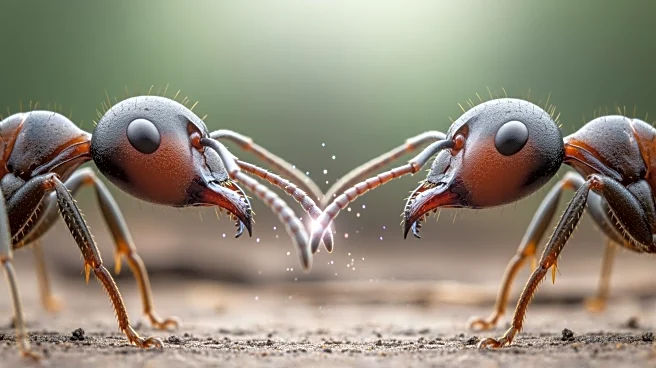What's Happening?
A parasitic ant species, Lasius orientalis, has been observed taking over colonies of a related species, Lasius flavus, by inciting the workers to kill their own queen. Researchers at Kyushu University in Japan discovered that the parasitic queen infiltrates
the host colony by cloaking herself in the scent of the worker ants, thereby avoiding detection. Once inside, she sprays the host queen with a chemical, likely formic acid, which prompts the workers to attack their own queen. This process involves multiple sprays and attacks before the host queen is killed, allowing the parasitic queen to lay her eggs and have them tended by the workers. This strategy allows the parasitic queen to bypass the vulnerable founding phase of colony establishment.
Why It's Important?
The discovery of this parasitic behavior highlights the complex interactions within ant colonies and the sophisticated strategies employed by parasitic species. Understanding these dynamics is crucial for ecological studies, as ants play significant roles in ecosystems worldwide. The ability of Lasius orientalis to usurp host colonies could inform strategies to manage invasive ant species, which pose challenges to ecosystems due to their aggressive colonization tactics. This research underscores the importance of studying ant behavior to develop methods for controlling invasive species and preserving ecological balance.
What's Next?
Further research is needed to explore the prevalence of this parasitic strategy among other ant species. Scientists may investigate the chemical composition of the spray used by the parasitic queen to better understand its effects on host colonies. Additionally, this research could lead to the development of targeted methods to disrupt the parasitic takeover process, potentially offering new solutions for managing invasive ant populations. Collaboration between entomologists and ecologists could enhance efforts to protect native ant species and maintain ecosystem health.
Beyond the Headlines
The ethical implications of manipulating ant behavior for ecological management could be considered, as interventions may impact the natural balance of ecosystems. The study of parasitic ants also raises questions about the evolutionary adaptations that enable such complex social interactions. Long-term research could reveal insights into the resilience and adaptability of ant colonies, contributing to broader understanding of social insects and their roles in biodiversity.















